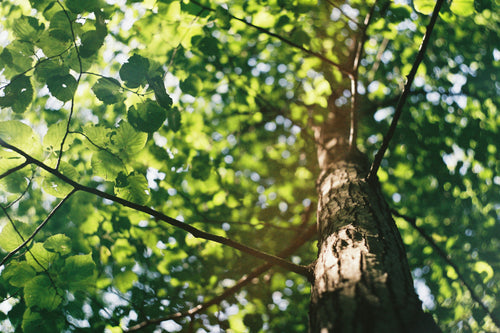Spring is a beautiful season filled with blooming flowers, chirping birds, and warmer weather. However, for those who suffer from poplar tree allergies, it can be a challenging time of year. Poplar trees are known for producing large amounts of pollen which can trigger allergic reactions in some individuals. If you're one of those people, don't worry. In this blog post, we'll discuss ways to prevent and treat poplar tree allergies so you can enjoy the beauty of spring without suffering from unpleasant symptoms. Read on to find out more.
What are poplar tree allergies?
Poplar tree allergies occur when the body's immune system overreacts to pollen released by these trees. The pollen is carried by the wind and can travel long distances, making it difficult to avoid. When a person with a poplar tree allergy comes into contact with the pollen, their immune system releases histamines, which trigger allergy symptoms.
Exploring Tree Pollen Allergies
Tree species are diverse, but not all trees produce highly allergenic pollen. Certain species are more allergenic than others. Here are some of the tree types that can commonly cause issues for those with allergies:
- Oak
- Birch
- Pine
- Maple
- Cedar
- Elm
- Ash
- Sycamore
- Pecan
- Walnut
- Willow
- Alder
- Hickory
- Beech
- Aspen
- Cottonwood
- Boxelder
- Olive
- Poplar
- Mulberry
It's important to note that having tree allergies doesn't necessarily mean you're allergic to all trees. You could be allergic to multiple species, or only one. This is why allergy testing is necessary; to determine which trees are causing your symptoms.
Tree pollen allergies tend to be most prevalent during the spring season. However, some trees may begin producing pollen early in the winter, and others may produce pollen throughout the summer. The timing depends on the climate and tree species in your area. Typically, tree allergy season is from late February to May.
What are the symptoms?
The symptoms of poplar tree allergies are similar to other seasonal allergies, including sneezing, runny or stuffy nose, itchy or watery eyes, coughing, wheezing, and itchy throat or ears.
How can you prevent poplar tree allergies?
Although it's impossible to avoid poplar tree pollen completely, there are several steps you can take to minimize your exposure and reduce symptoms. These include:
- Staying indoors on windy days when pollen counts are high.
- Keeping windows closed and using air conditioning to filter out pollen.
- Avoiding outdoor activities that can stir up pollen, such as mowing the lawn.
- Wearing sunglasses to protect your eyes from pollen.
- Showering and changing clothes after spending time outdoors to remove any pollen that may have collected on your body or clothing.
What are the relief options?
Fortunately, there are several relief options available if you experience poplar tree allergy symptoms, such as:
- Nasal sprays can provide relief for nasal congestion. It can also help with sneezing and congestion.
- Allergy shots, also known as immunotherapy, can help desensitize your immune system to poplar tree pollen over time.
- Using a saline nasal rinse can help flush out allergens from your nasal passages.
It's crucial to consult a healthcare professional before starting any new medication or treatment for your allergies.
By understanding the facts about poplar tree allergies, taking preventive measures, and seeking appropriate relief options, you can minimize the impact of these allergies on your daily life. Don't let allergies prevent you from enjoying the beauty of spring!
Foods to Avoid if You Have Tree Pollen Allergies
Did you know that some foods can sometimes trigger an allergic reaction if you have a tree pollen allergy? In some cases, the immune system can confuse similar proteins in certain foods with the proteins found in tree pollen. If you have tree allergies, be cautious of these foods:
- Almonds
- Apples
- Bananas
- Celery
- Cherries
- Figs
- Hazelnuts
- Kiwis
- Parsnips
- Peaches
- Peppers
- Potatoes
- Soy
- Strawberries
If you experience an itchy or tingling sensation in your mouth, throat, or lips after consuming cross-reactive foods, you may be experiencing oral allergy syndrome (OAS). Seek immediate medical care if you have a severe reaction to any food.
Tree Pollen FAQs
What are Tree Allergies?
Tree allergies, also known as pollen allergies or hay fever, are caused by the pollen released by trees. Individuals with tree allergies may experience sneezing, runny nose, itchy eyes, and congestion when they come into contact with tree pollen.
Which Trees Commonly Cause Allergies?
Several types of trees, such as oak, maple, birch, pine, willow, cedar, and juniper, can trigger allergic reactions due to their large amounts of pollen.
When Do Tree Allergies Occur?
Tree allergies are most common during spring when trees release pollen to fertilize other trees. The exact timing of tree pollen release varies depending on the tree species and geographical location. However, as a general rule, tree allergies tend to peak in the months of March, April, and May.
How Can Tree Allergies Be Managed?
While it is impossible to completely avoid tree pollen, there are several strategies that can help manage tree allergies:
- Monitor pollen forecasts and stay indoors when pollen counts are high.
- Keep windows closed and use air conditioning to filter out pollen.
- Avoid outdoor activities during peak pollen times, usually early morning and late afternoon.
- Wear sunglasses to protect your eyes from pollen.
- Shower and change clothes after spending time outdoors to remove pollen from your body and clothing.
- Consider using over-the-counter antihistamines or nasal sprays to alleviate symptoms.
- Consult with an allergist for a proper diagnosis and personalized treatment plan.
Can Tree Allergies Be Prevented?
Unfortunately, tree allergies cannot be prevented entirely. However, taking proactive measures to minimize exposure to tree pollen can significantly reduce the frequency and severity of allergic reactions. By following the management strategies mentioned above, individuals with tree allergies can lead a more comfortable and symptom-free life during the allergy season.
CUSTOMIZED ALLERGY TREATMENT AT HOME:
Using multiple over-the-counter allergy treatments is not ideal for getting through allergy season. Skip the drugstore and get a personalized all-in-one allergy treatment from the comfort of your home.
Allermi is a customized allergy nasal spray designed by experienced, board-certified allergists to solve your unique seasonal allergy symptoms. The Allermi formula is backed by science to give you the most effective allergy treatment for your individual allergy symptoms.
The best part? Allermi nasal spray is easy to use and delivered to your door.





